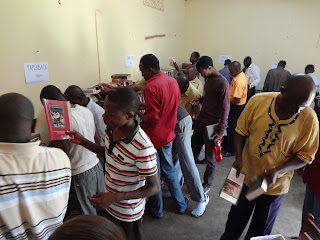Remember all those
books I sorted back in January? That was a crazy week...Joshua and I sorted through hundreds of books to find if any were relevant for the library. It was fun to find a few 'treasures' (a huge dictionary!!) but it was also heartbreaking. In hundreds of boxes we only kept about 10 boxes of books. I saw firsthand the frustration that comes with donations that are irrelevant, out of date, falling apart, etc. It's the frustration that comes with being given other people's old stuff. And I'm not saying any of those books were particularly bad, just not what a theological college library needs.
Anyway, after we sorted out all those books I was told at some point the college wanted to have a book sale. I had a professor in graduate school who told us to avoid organizing book sales...he told us they are a lot of work and it's ok to let library friends' groups organize them. He warned us. So with that in the back of my mind and the common sense that said I do NOT want to sort those books again, I've been avoiding the book sale all year.
But as things go, this week I could avoid it no longer. I was told on Monday that the administration wanted to have the book sale this week. So Joshua and I geared ourselves up for a busy week. We announced the sale to students, we printed signs, got help resorting books, organized books, moved books, arranged books, etc. Basically, I've slept quite well all week from the extra exercise! :)
 |
| Books ready for selling! |
 |
| So glad there were shelves in our 'store'! |
 |
| Everyone loves a bargain, right? :) |
By Thursday (our first day of the sale) the students were stopping me regularly to ask what books we would sell and if I could help them find some good ones. Or if I would set some aside for them. I told them to just come look. We placed several boxes of magazines outside our 'store' (i.e. empty storage room now filled with books for sale) and as we headed toward it on Thursday just before the sale began, we were greeted with this sight of students looking at the magazines:
 |
| (Personally, I love the student with the box on his head :)) |
 |
| Looking at free magazines outside! |
And with that we knew we were in for a busy afternoon. Once the sale began...it was chaotic! Exciting but a bit crazy. Students were all over and Joshua were trying to keep up with everything.
 |
| Joshua took this by standing on a chair...I love the chaos it captures! |
 |
| Helping students organize their purchases |
And for almost three solid hours that was what we did. Kept track of purchases, answered questions, moved books, helped find books, argued with students that we were not a market open for bargaining, etc. And by the time the students began clearing out, we had a room that looked like this:
Today's sale was MUCH more calm. Still busy but not so crazy. With fewer students we were able to help them individually a bit more, which was nice. We always had customers but never more 7 or 8 at a time.
 |
| Day Two! |
And, actually, I've learned a lot the past couple days. Because even though
I thought the donated books were a bit silly and no one would want them, the truth really is you can't judge a book by its cover. Because those students bought lots of books! Before the sale some of the administration wanted us to price the books based on content, but I told them I couldn't do that because what's important to one person isn't necessarily important to another. And it's true. There are a number of books I thought 'No one will want this' but sure enough, many of them were bought the first day. I mean, if you think about it, in the US we have tons and tons of books at our fingertips. But here, for many of these students, this is there chance to build a personal library. And, really, it was scenes like these that make the chaos and craziness all worth it:
 |
This student was amazing...came with a list of the
categories of books he wanted and went through
book by book to find one in each category. |
For those of you still looking at these pictures, I'll finish with my favorite scene from the day. Sometime during the craziness I found a few of the kids that live on the compound trying to sneak away with one of our boxes of magazines that was sitting outside, free for the taking. I had told them earlier they could each have a 'book' but caught them doing this. They were so cute I couldn't be mad. :)


































